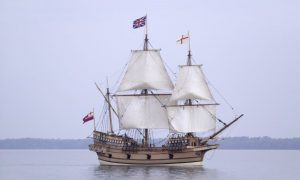[ad_1]
There are many commonly used phrases in the English language that originated with sailors—some of which are rather obvious. For instance, “run a tight ship,” “plain sailing,” and “on an even keel” have clear maritime roots. But there are other idioms and phrases that are less obviously ship-related, usually because they don’t contain well-known nautical words. Here are 10 such phrases and their high seas origins.
Related: Top 10 Backstories For Popular Idioms
10 To Show One’s True Colors

“To show one’s true colors” means to reveal one’s true nature, which comes from the use of flags at sea. The word “colors” means “flags” in a military context, and ships would sometimes sail under false colors in the past in order to get closer to their enemy. Pirates often employed this tactic, but so did navy ships that were at war.
However, it was generally accepted that “a ship may not fire without showing her true colours,” as described in Mountague Bernard’s A Historical Account of the Neutrality of Great Britain During the American Civil War (1870). The earliest printed use of this phrase comes from Thomas Becon’s 1551 A Fruitful Treatise of Fasting, which says that the devil “setteth forth him selfe in his true colours.”
“To pass with flying colors”—meaning to have done extremely well—has a similar origin story. After winning a battle, ships would fly their regimental flag to signal their victory. The losing ships would have to strike their colors, meaning lowering their flags.[1]
9 Toe the Line

The exact origin of the phrase “toe the line”—meaning to conform to a standard or to quite literally form a line—is hazy, but it can be traced back to the Royal Navy and British Army. Which organization started using the phrase first is unknown. However, it first appeared in printed format in 1738 in John Railton’s The Army Regulator to describe troops being called into a neat formation.
In a naval context, the first printed mention of the phrase is from Captain Basil Hall in 1831, with a description of a crew on the deck being “ranged in a line, each with his toes at the edge of a plank,” so that they could be scolded in what were “technically called ‘toe-the-line’ matches.” Disobedient sailors could also be punished by being forced to stand still on the line of a plank for hours at a time.[2]
8 Pipe Down
With the sounds of the wind and the waves, being aboard a ship can be very loud, so common orders are given with the whistle of a pipe. One such command is “pipe down,” which signals that the crew is dismissed, after which the ship would usually get much quieter. As a result, saying the words “pipe down” began to mean “be quiet.”
This command is noted in Leonard Gillespie’s Advice to Commanders and Officers (1798), which reports that “at four o’clock, P.M. the hammocks should regularly be piped down.” The words being spoken, rather than the instrument being played, occur in Herman Melville’s 1850 novel White-Jacket, which was partially based on his experiences in the United States Navy. “‘Pipe down!’ cried the Captain, and the crew slowly dispersed.”[3]
7 By and Large
Used to mean “mostly” or “on the whole” in everyday speech, “by and large” is rooted in seafaring terminology. It was basically shorthand for “close-hauled and not close-hauled,” which refers to how a ship sails in the wind. “By” is “close-hauled” and means that the ship is sailing as directly as possible into the wind. “Large,” or “not close-hauled,” means that the wind is hitting the stern (or back) of the ship.
Essentially, describing a ship as sailing well by and large means that it can handle different wind directions. The earliest known printed reference to this phrase appears in Samuel Sturmy’s 1669 The Mariners Magazine. “Thus you see the ship handled in fair weather and foul, by and learge.”[4]
6 Three Sheets to/in the Wind
In nautical terminology, sheets are ropes (or sometimes chains) that are attached to the sails and allow the crew to direct the ship. If the sheets come loose, then the ship can move in uncontrollable directions, looking much like a staggering drunk person who can’t walk in a straight line. Hence, describing someone as “three sheets to/in the wind” means that they are drunk.
The first printed use of this idiom can be found in Pierce Egan’s Real Life in London (1821): “Old Wax and Bristles is about three sheets in the wind.” Although nowadays the phrase is almost always “three”—and also favors “to” rather than “in”—it was used as a scale to measure drunkenness, with one sheet to/in the wind describing someone who was merely tipsy. This usage can be found in Catherine Ward’s The Fisher’s Daughter (1824). “Wolf replenished his glass at the request of Mr. Blust, who, instead of being one sheet in the wind, was likely to get to three before he took his departure.”[5]
5 Hand over Fist
The idiom “hand over fist”—meaning to do something fast, often used in the context of making or losing money quickly—has a strong nautical background. However, it’s not certain that it originated aboard ships. It began as “hand over hand” in the mid-18th century and referred to the motion of a person’s hands as they were climbing or hauling in a length of rope. Rope is obviously not exclusive to ships, but it’s undeniably very familiar to sailors.
This phrase first appears in a 1736 letter written by Benjamin Cooke, where he describes a man using a rope to go down a well “hand over hand, as the Workmen call it.” In a naval context, the phrase is first mentioned in 1769, with William Falconer’s An Universal Dictionary of the Marine, which states that “a sailor is said to go aloft, hand-over-hand, when he ascends into the tops, &c. by a single rope.”
By at least the 1820s, the phrase had changed into “hand over fist,” as is seen in William Glascock’s 1826 The Naval Sketchbook, which describes the French “coming up with us, ‘hand over fist,’ in three divisions.” Around this same time, the phrase’s connotation with speed and money also developed. Seba Smith’s 1833 novel The Life and Writings of Major Jack Downing describes people who “clawed the money off of his table, hand over fist.”[6]
4 Taken Aback
In naval terms, “aback” refers to the ship’s sails being pushed against the mast by the wind, and being “taken aback” describes this happening suddenly, either because of an abrupt change in the wind’s direction or because of the crew changing the ship’s course. Nowadays, landlubbers use “taken aback” to indicate general surprise.
The word “aback” can be traced to at least the late 17th century, with “I braced my topsails aback” appearing in a 1697 edition of the London Gazette, while “taken aback” appears in a 1755-56 edition of the Philosophical Transactions of the Royal Society of London. “If they luff up, they will be taken aback, and run the hazard of being dismasted.” The broader use of the phrase filtered into the English language during the 1800s. For instance, Charles Dickens says he was “ever so taken aback” in his 1842 American Notes for General Circulation.[7]
3 Dutch Courage
“Dutch courage” refers to drinking alcohol to gain confidence or courage and originates with the Royal Navy. During the Anglo-Dutch Wars of the 17th and 18th centuries, English sailors would use “Dutch” as an insult. “Dutch courage” leans into stereotypes of Dutch drunkenness—at the time, they were known for producing a spirit derived from juniper that was called genever (and later became gin).
Other idioms that use “Dutch” derisively include “going Dutch,” which means people paying for their own bill and plays on stereotypes of Dutch frugality, and “Dutch bargain,” which is a deal struck while drunk and carries similar connotations as “Dutch courage.”
The first printed allusion to the idea of the Dutch drinking to gain courage in battle can be traced back to a 1665 poem by Edmund Waller, which features the line, “The Dutch their Wine, and all their Brandy lose, / Dis-arm’d of that from which their Courage grows.” The exact phrase “Dutch courage” first appears in print in 1781 when Captain Decker wrote to the Amsterdam Gazette and reported, “It is very probable the Dutch sailors were drunk. Dutch courage has been long proverbial.”[8]
2 Turn a Blind Eye
The idiom “turn a blind eye”—which means to willfully ignore something—is attributed to Royal Navy officer Horatio Nelson. During the 1801 Battle of Copenhagen, Admiral Hyde Parker feared that the British Navy was losing, so he signaled his second-in-command, Nelson (who was stationed on another ship), to retreat. However, Nelson wasn’t one to back down from a fight.
On being told of the signal, Nelson reportedly said, “I have only one eye–I have a right to be blind sometimes.” He then raised his telescope to his glass eye—his eye had been injured in a previous battle—to look toward the flagship and then declared, “I really do not see the signal!” This tale was first recounted in Robert Southey’s Life of Nelson, published in 1813, and may be little more than a myth, but regardless, it spawned the common phrase “turn a blind eye.” Incidentally, Nelson made the right call to continue fighting, as the Danes soon agreed to a truce.[9]
1 Slush Fund
These days, a “slush fund” refers to money kept back to buy miscellaneous items, but it often has an illegal connotation. Politicians sometimes use slush funds to buy favor, silence, or information. Given the illicit nature of these transactions, this money is usually kept secret and separate from money used for legitimate purposes.
In the 18th century, slush was the word for “refuse grease and fat from cooking especially on shipboard.” Slush was used to make products such as candles, so the ship’s cook would store the fat in a barrel until the ship reached land and it could be sold. This money—known as a slush fund by at least the early 19th century—was supposed to go back to the crew because, as William McNally’s Evils and Abuses in the Naval and Merchant Service, Exposed (1839) explains, “the provision is weighed to the crew before being boiled, all that comes from it ought to be given to them, as it forms a component part of their ration.”
Unfortunately, the higher-ups aboard the ship would often not give this money to the crew and would instead buy frivolous items for their own cabins, such as cushions and rugs. The phrase had jumped from ship to land by the middle of the 19th century and quickly became associated with bribery and criminal purposes.[10]
[ad_2]
Source link

